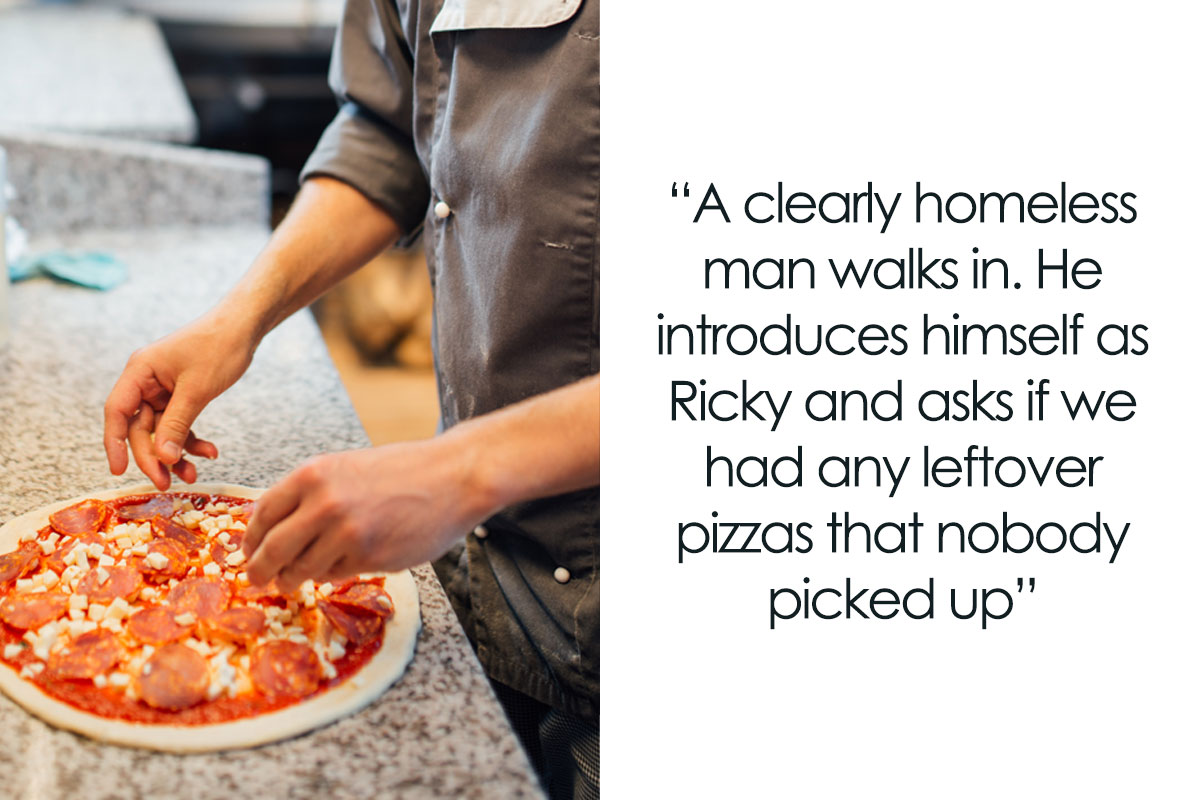
Worker Scolded For Trying To Buy A Homeless Man Pizza, Customer Finds A Brilliant Loophole
They say no good deed goes unpunished. But when the universe is being particularly kind, the person who receives the punishment actually deserves it.
One former employee of a pizza joint recently shared on Reddit how he was once scolded for attempting to buy a homeless man dinner. Thankfully, however, a brilliant customer came up with the perfect way to ensure that the man got to eat plenty of delicious pizzas free of charge. Below, you’ll find the full story, as well as a conversation with Lucy Self of FoodCycle.
This former employee of a pizza place was once berated for buying a homeless man dinner
Image credits: Artranq (not the actual photo)
So another customer came up with a brilliant plan to ensure that he didn’t go hungry again
Image credits: halfpoint (not the actual photo)
Image credits: rawf8 (not the actual photo)
Image credits: Huge_Buddy_2216
Later, the man responded to several readers and shared additional details on the situation
There are currently over half a million unhoused individuals living in the United States
It can be easy to forget about the homelessness crisis when you have a warm, cozy bed to sleep in every night, but the painful reality is that in the United States, there are currently about 582,000 unhoused individuals. This includes sheltered and unsheltered residents, meaning those who have the opportunity to temporarily stay in safe havens, motels, domestic violence shelters, with friends for a couple of weeks, as well as those who are left to seek shelter on the streets, in abandoned buildings, in cars and in other places not intended to house humans. 60% of unhoused individuals in the US are men, and veterans experience homelessness at slightly higher rates than the overall population.
Contrary to what some privileged people might assume, it’s actually dangerously easy to become homeless and much harder to get back on your feet following a bout of being unhoused. Some of the factors contributing to the homelessness crisis are exorbitant living costs, low-incomes, health issues, having nowhere to go when escaping domestic violence, and racial disparities. In the US today, 11 million households living in poverty pay at least half of their income towards housing, meaning that they are at high risk of becoming homeless if their source of income is suddenly reduced or cut off.
When it comes to health issues, people residing in shelters are more than twice as likely to have a disability than the rest of the population. Over one fifth of unhoused individuals report having serious mental health illnesses, and 16% struggle with chronic substance abuse. And while Black Americans make up only 13% of the country’s population, they account for a startling 37% of homeless individuals and half of all homeless families with kids. Considering that there are so many individuals on the streets and in shelters who clearly need assistance, it’s heartbreaking to hear that restaurants in the United States continue to throw away 94% of their excess food. Many have policies against employees taking home food or donating what’s left at the end of a shift, despite there being 38 million food insecure Americans.
Image credits: Chris John (not the actual photo)
Finding food can be extremely difficult when homeless, despite the fact that restaurants throw away nearly all of their leftovers each day
To gain more insight on the topic of getting food into the hands and stomachs of those who desperately need it, we reached out to Lucy Self, PR Manager of FoodCycle, a UK-based organization that’s focused on preventing food waste and hungry bellies. “At FoodCycle, we’re passionate about transforming surplus food into healthy, delicious meals for anyone that needs them, no questions asked,” Lucy shared.
But when it comes to why some companies are business owners are so hesitant to share their leftover food with unhoused individuals, Lucy noted that over the past few months, access to surplus food has become harder. “This is due to a number of reasons; food prices have increased so reduced items that we might normally get are selling out faster, surplus food is being distributed in other ways (such as being sold on apps) and supermarkets are seeing a shortage in supply of some fresh food items, which means stocks are limited and what they do have is selling out fast,” she explained. “This means that sometimes there isn’t any food left to donate, either to FoodCycle directly or the food distribution charities and organizations we work with.”
If you happen to live in England or Wales, Lucy invites you to have a meal at FoodCycle. “We welcome anyone from the community to come along and eat with us,” she shared. “You’ll not only be helping us to save food that might have ended up in the bin, but you might end up connecting to someone else in your community or making a new friend. We serve free vegetarian meals made from surplus food on nicely laid tables with a cup of tea or coffee. It gives people in the community a chance to sit down and have a restaurant-style experience and a chance to have a good chat and perhaps forget about worries for a couple of hours in a warm space.”
“Over the last year, we have seen a 59% increase in the number of community meals being served and with cost of living and rising food prices, we anticipate this demand will continue to increase,” Lucy told Bored Panda. “Anyone can come and collect a meal/food for whatever reason. Our guests range from those who are homeless, elderly, low-income families and people who simply cannot afford to buy food.”
Image credits: MART PRODUCTION (not the actual photo)
Without relying on the kindness of strangers, many would have no access to food at all
If you’re looking for something to do in your own community that will make an impact, there are often volunteer programs where individuals can take donated food out onto the streets and bring it to those who are hungry but unable to access the facilities. You can even start a food drive in your own community to gather as much as you can to help those around you. And, of course, you can create your own care packages to pass out to whomever you encounter on the streets in your own city. According to Our Father’s House Soup Kitchen, the best non-perishables to give to unhoused individuals are anything that lasts for days, doesn’t require utensils to eat and is preferably quite filling.
Some of the foods they recommend are canned stews, bottled water, cereal bars, gum or mints, canned beans or tuna, peanut butter, pre-packed cheese, tuna or chicken salad snack packs, cup noodles, cracker packs, fruit snacks, pudding cups, apple sauce, jelly and trail mix. It’s also recommended to avoid any foods that will be too hard on a person’s teeth, as they likely don’t have access to dental services. Foods that are easy to chew are ideal. And if you’re on a tight budget yourself, don’t hesitate to ask friends and or family members to help donate as well.
Despite the fact that many people are homeless due to factors outside of their own control and having a lack of resources, there is unfortunately still a stigma associated with being unhoused. Thankfully, the man in this story, along with the help of Henry, was able to keep one person from going hungry for a few months, but business owners should never look down on their employees for trying to help another human being out. We would love to hear your thoughts on this wholesome act of petty revenge in the comments below, pandas. Have you ever been in a similar situation with an employer? Then, if you’re interested in checking out another Bored Panda article discussing the homelessness crisis in the US, we recommend reading this piece next.
Image credits: Timur Weber (not the actual photo)
Some readers were less than impressed with the man’s generosity
Others, however, applauded the employee for ensuring that one less person went hungry
263Kviews
Share on FacebookIt’s very sad how much food goes to waste in our world when so many people are hungry.
Makes me think about how supermarket food waste is illegal in France. They have to donate (edible) leftover stock to food banks. The rest of the world should take notes.
Load More Replies...Can’t remember the name of it, but I remember seeing a movie made in the very early 1930s, the depths of the Great Depression as a child, with a scene where two people in formal wear were leaving a swanky club and went around the back of the building. There they saw some of the kitchen staff handing out food to a whole line of hobos. Now remember, I said it was a swanky club (using the jargon of the time), so we’re not talking crusts of bread here. They were handing out the kind of good food served in the club. I know the screenwriter had to have gotten the idea for that scene because they saw it happen in real life. So, if we could do that during a catastrophic economic depression, why tf can’t we do it now?
Because "We'Re LoSiNg MoNeY tHeEeEeEn". You'll be losing money anyways, move tf over.
Load More Replies...Anyone who is paid $8.50 an hour cannot be accused of workplace stealing by his employer.
Early 2000's though. What you could buy for $8.50 in 2000 is a lot more than today. Probably more than $20 does today.
Load More Replies...It’s very sad how much food goes to waste in our world when so many people are hungry.
Makes me think about how supermarket food waste is illegal in France. They have to donate (edible) leftover stock to food banks. The rest of the world should take notes.
Load More Replies...Can’t remember the name of it, but I remember seeing a movie made in the very early 1930s, the depths of the Great Depression as a child, with a scene where two people in formal wear were leaving a swanky club and went around the back of the building. There they saw some of the kitchen staff handing out food to a whole line of hobos. Now remember, I said it was a swanky club (using the jargon of the time), so we’re not talking crusts of bread here. They were handing out the kind of good food served in the club. I know the screenwriter had to have gotten the idea for that scene because they saw it happen in real life. So, if we could do that during a catastrophic economic depression, why tf can’t we do it now?
Because "We'Re LoSiNg MoNeY tHeEeEeEn". You'll be losing money anyways, move tf over.
Load More Replies...Anyone who is paid $8.50 an hour cannot be accused of workplace stealing by his employer.
Early 2000's though. What you could buy for $8.50 in 2000 is a lot more than today. Probably more than $20 does today.
Load More Replies...
 Dark Mode
Dark Mode 

 No fees, cancel anytime
No fees, cancel anytime 



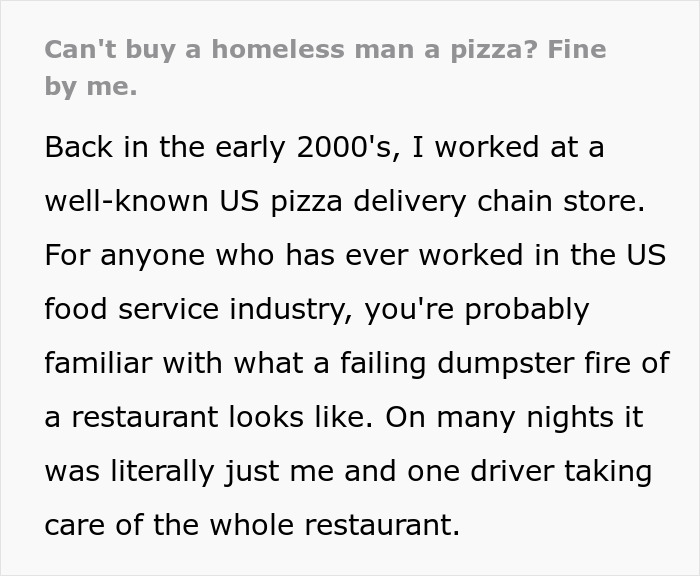

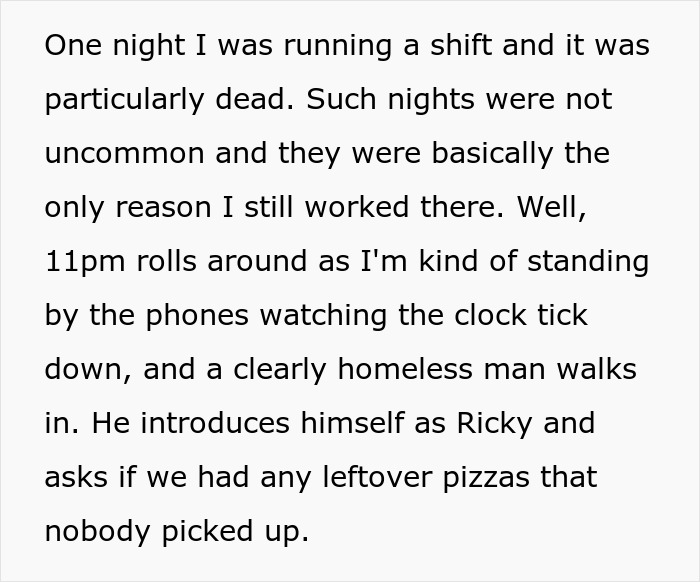


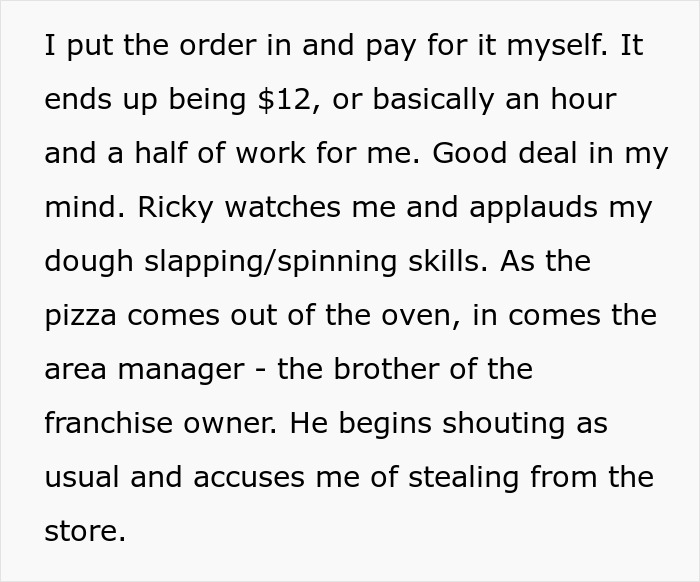
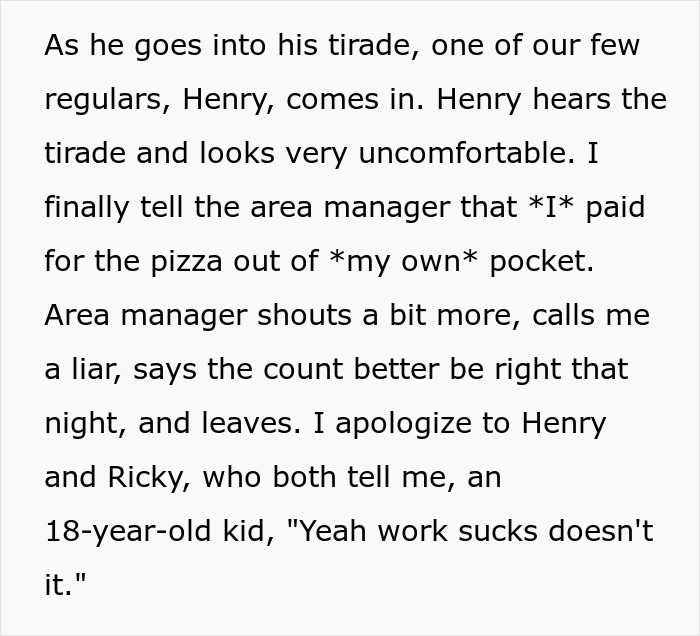




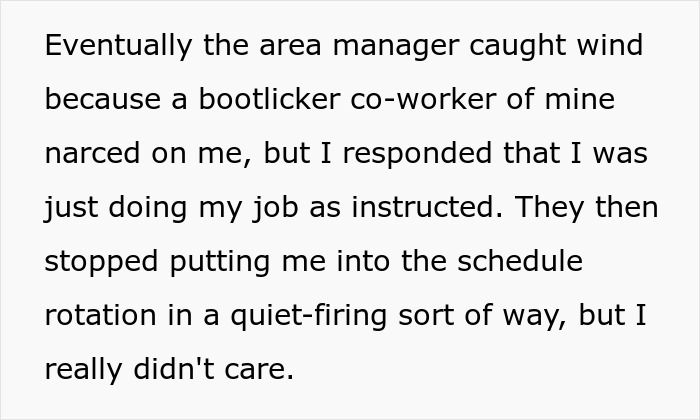

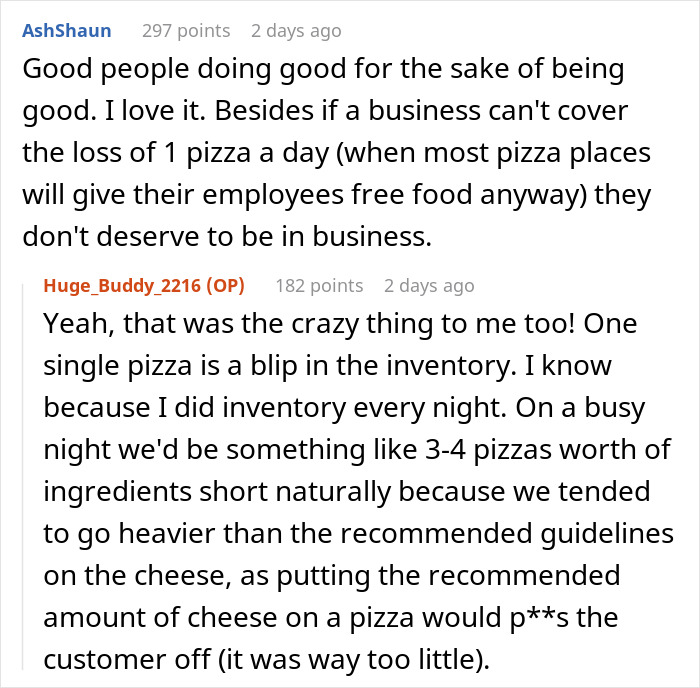





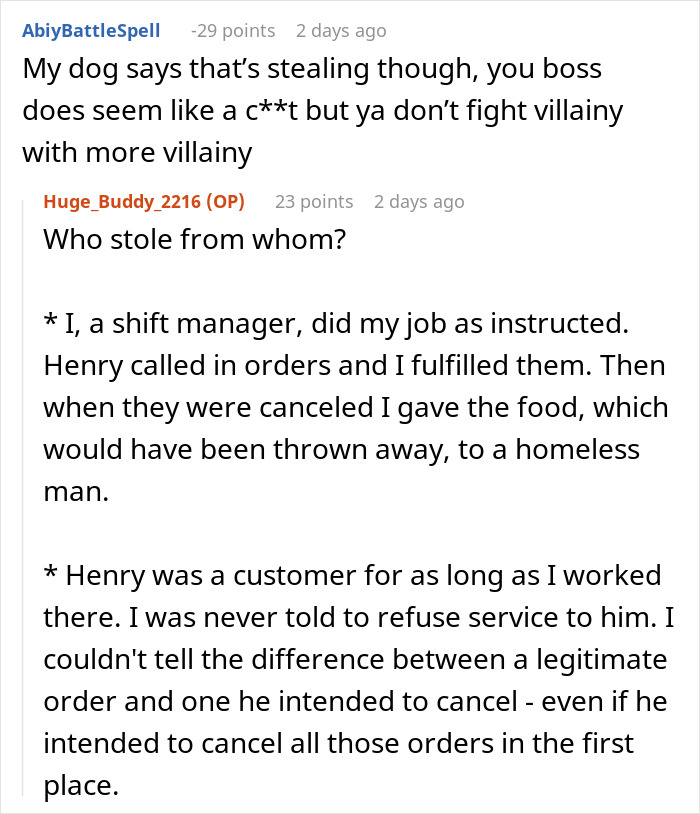



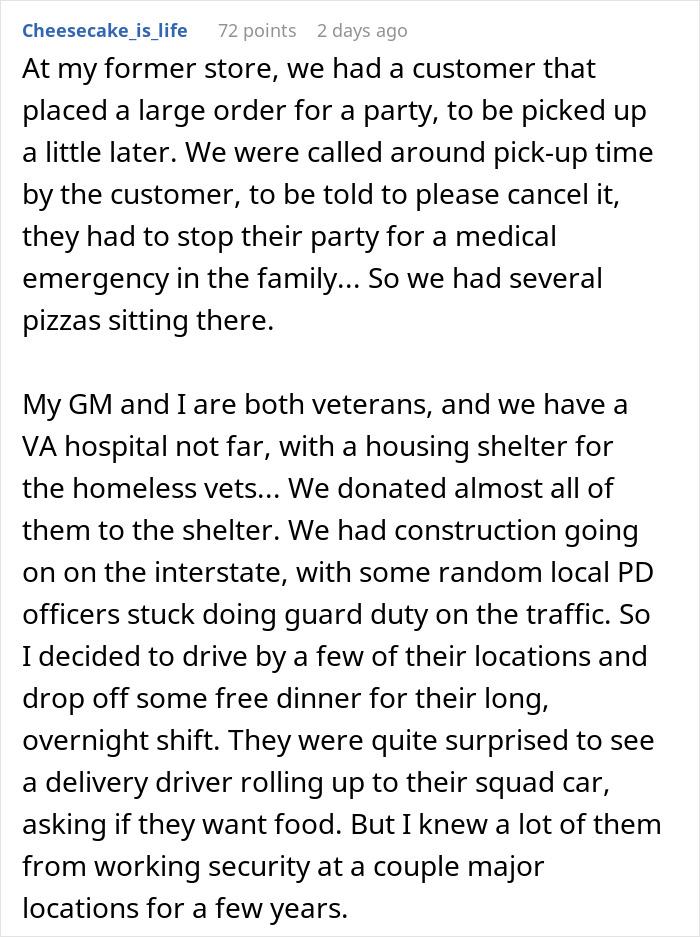


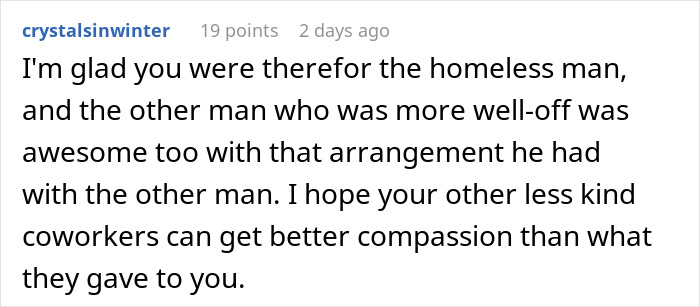


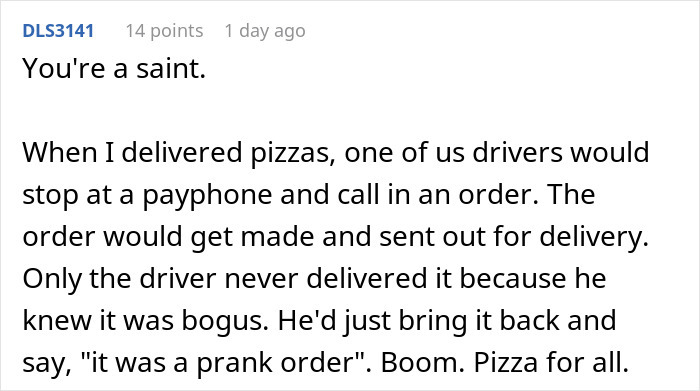











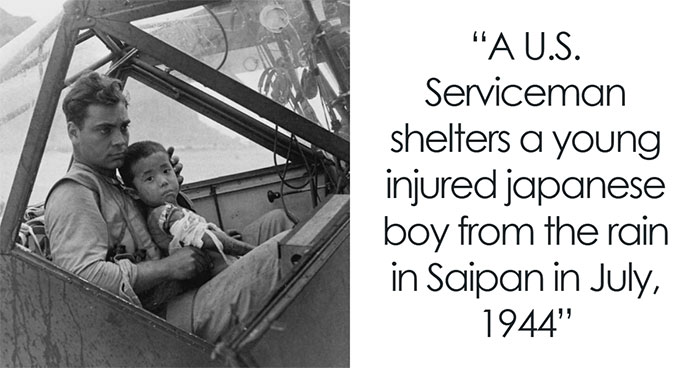
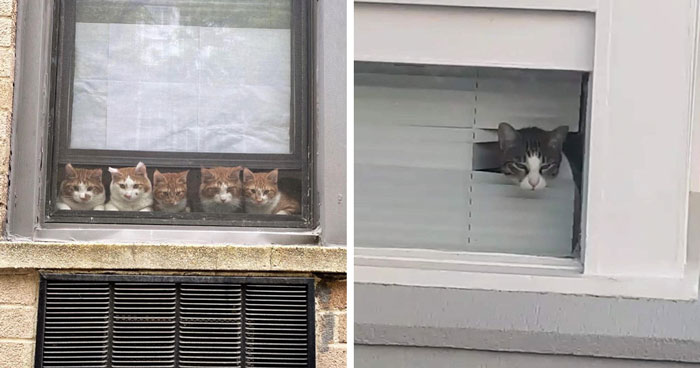
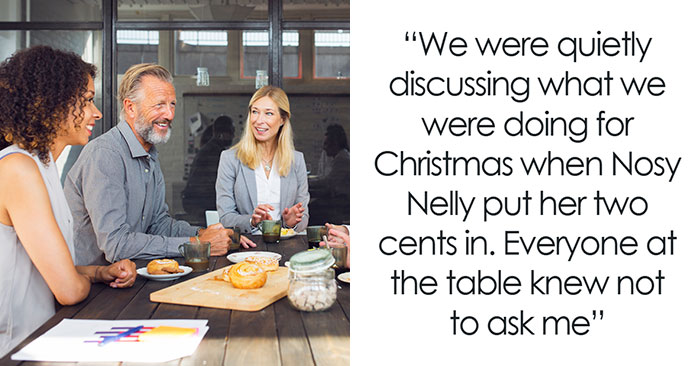








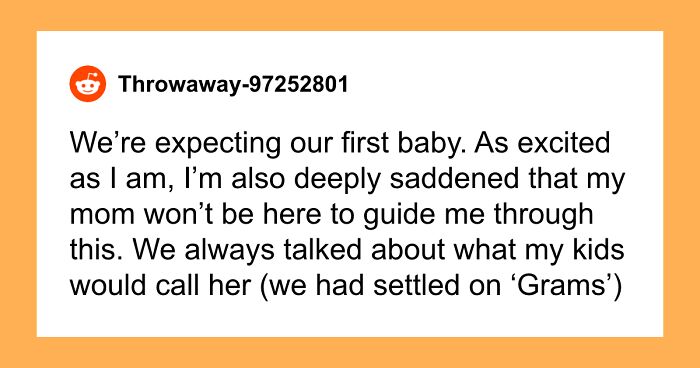
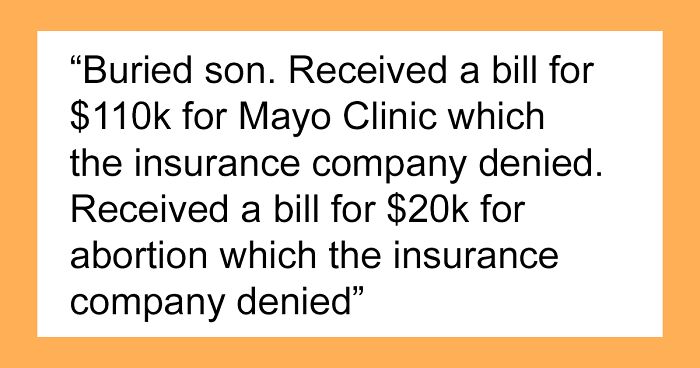

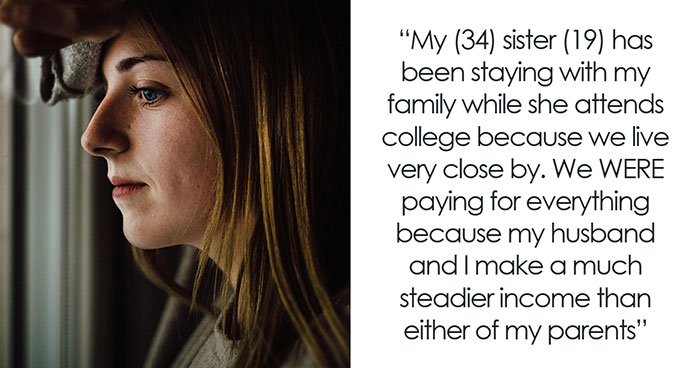



122
40